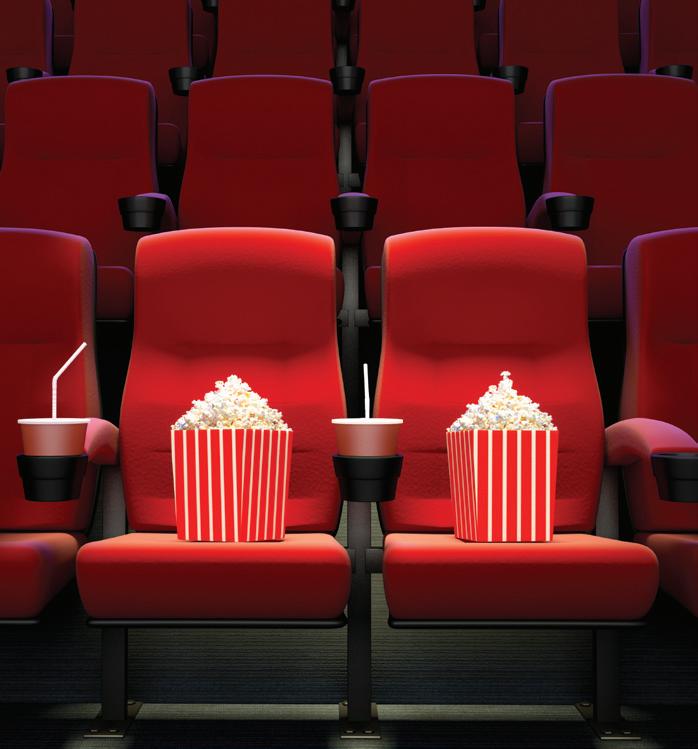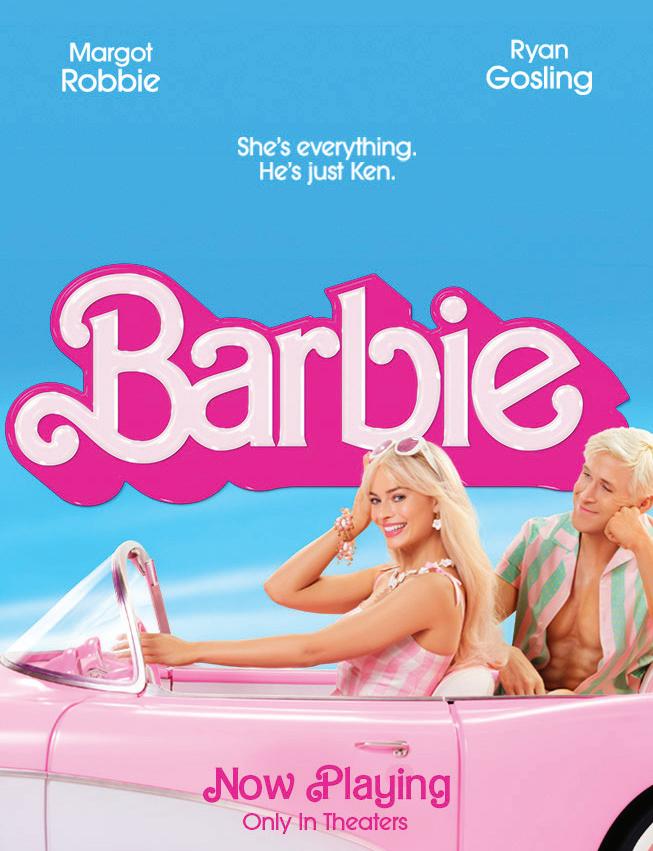
3 minute read
It’s a Barbie world — and the stars sparkle
ith Margot Robbie in the title role and Ryan Gosling as her Ken, Barbie begins as an unmitigated delight. The introduction could hardly be bettered: An uproarious sendup of the opening of Kubrick’s 2001: A Space Odyssey (1968) sets the satirical tone for what is to follow, although in varying degrees of success.
The film’s first half, set in the pictureperfect and unmistakably plastic world of “Barbie Land” is remarkably, refreshingly self-aware and self-mocking — but never cynical. For Barbie and Ken — and the various incarnations of both dolls in the popular Mattel toy line — every day is absolutely perfect and every day is absolutely the same.
Advertisement
That changes when Barbie begins to ponder things that she otherwise wouldn’t, such as death and the suspicion that not every day is perfect for everyone. This compels her to embark on a journey of self-discovery that will open her eyes to the “realities” — such as they are — of the “Real World.”
Robbie (also a producer) is the living, breathing embodiment of a Barbie doll. She totally gives herself to the role without a hint of condescension. It’s a slyly funny, even witty turn, and she looks as if she’s having a ball — and she also happens to be drop-dead gorgeous. Even better is Gosling, himself a looker, who gives one of the best (and funniest) performances of his career as Barbie’s perennial, plastic paramour Ken. He goes for easy laughs and gets them, but he also reaches beyond the obvious and scores those laughs, too. They’re truly a dynamic comedy duo, and whatever else one can say about Barbie, Robbie and Gosling makes it worth seeing all by themselves.
When the film leaves the friendly, eyepopping confines of “Barbie Land” — with special kudos to production designer Sarah Greenwood — and makes the jump to the “Real World,” the narrative becomes far more conventional. The “Real World” isn’t what it’s cracked up to be; it’s a hotbed of discrimination, sexism, and
Wsheer ignorance. To say that Barbie’s mind is blown would be an understatement, and it’s an unexpected delight when she su ers what other Barbies perceive correctly as an existential crisis. Once again, it’s Robbie to the rescue, conveying the character’s confusion in a humorous, even touching fashion.
America Ferrera plays Gloria, the Mattel receptionist who unwittingly caused Barbie’s dilemma in the first place, and her eventual rapprochement with inexplicably grumpy young daughter Ariana Greenblatt (recently seen in the alreadyforgotten summer sci-fi outing 65) is in the cards from the o ng, so there’s no tension there. Indeed, their characters feel less believable, or even alive, than Barbie and Ken do.
Among those featured in support, some more prominently than others, are Kate McKinnon (as “Weird Barbie”), Dua Lipa (in her feature acting debut), Michael Cera, Rhea Perlman, Emma Mackey, Simu Liu, Alexandra Shipp, Connor Swindells, John Cena, and Rob Brydon. Narrator Helen Mirren gets o a few good lines, including a gem about Margot Robbie, but otherwise hasn’t all that much to say, and Will Ferrell’s customarily animated and energetic turn as the CEO of Mattel is familiar territory.


To some extent, Barbie echoes The Truman Show and Pleasantville (both 1998) and, more recently, The LEGO Movie (2014) by incorporating the themes of identity, individuality, conformity, and media manipulation within a fanciful, even otherworldly, setting. Unlike those films, however, Barbie tends to ladle on those elements a bit too stridently. It’s as if director Greta Gerwig, who co-wrote the screenplay with fellow executive producer and life partner Noah Baumbach, didn’t quite have faith in the audience to easily pick up on them. The momentum of the film isn’t derailed, but it is dampened as a result.

Of course, there are those observers — and we don’t mean critics — who have labeled the film as some sort of feminist tract. That may be reading a bit too much into it. This is Barbie, after all. Then again, there was likewise some “controversy” over Disney’s recent live-action remake of The Little Mermaid, which some perceived as being a “socialist manifesto.” Perhaps there were complaints too about Super Mario Bros. — beyond the movie itself, of course — but these so-called debates seem to indicate that some people have way too much free time on their hands and appear to be looking (a bit too hard) for things to complain about. As Alfred Hitchcock once said: “It’s only a movie.” !
The Sportscenter Athletic Club is a private membership club dedicated to providing the ultimate athletic and recreational facilities for our members of all ages. Conveniently located in High Point, we provide a wide variety of activities for our members. We’re designed to incorporate the total fitness concept for maximum benefits and total enjoyment. We cordially invite all of you to be a part of our athletic facility, while enjoying the membership savings we offer our established corporate accounts.










